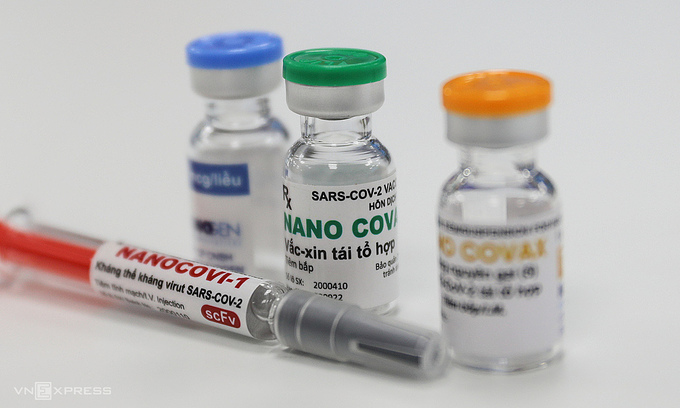Vietnam readies vaccine passport entry for investors, tourists

A syringe with a dose of the made-in-Vietnam Covid-19 vaccine Nanocovax is placed next to three vials of the vaccine in HCMC, December 2020.
Photo by VnExpress/Quynh Tran.
Vietnamese stranded abroad, foreign investors, and vaccinated tourists are three groups who might be able to enter Vietnam with a vaccine passport, officials say.
At a regular meeting of the National Steering Committee for Covid-19 Prevention and Control, related agencies and telecom providers said Friday that the information technology infrastructure for handling Covid-19 vaccine passports was basically ready and “fully adapts to international preparations of vaccine passport deployment.”
Last month, the committee had said that concerned agencies should be prepared to offer their best services for the most complicated cases if and when Vietnam adopts a policy to allow vaccinated foreigners to enter the country.
The IT infrastructure that is being prepared for vaccine passports should include the software and website system to confirm information of people entering the nation, like conditions of entry permits, types of vaccine, nationalities of the citizens and other related information, the committee had said.
Following the latest developments, the committee has decided to target the dual goals of making maximum efforts to keep the community safe from the pandemic while opening the doors to facilitate economic development. This would include mass vaccination of Vietnamese citizens and coordinating with other countries to categorize those allowed to enter Vietnam.
With the vaccine passport, specifically, Vietnam would divide entrants into three different groups.
The first group would be Vietnamese citizens who are stranded abroad and have been administered the Covid-19 vaccine. The Ministry of Health will be in charge of providing detailed guidance on isolating and monitoring arrivals from different countries. A similar protocol would also apply for Vietnamese businesspeople returning home after going abroad in pursuit of investment and business opportunities.
The second group would be foreigners entering Vietnam to invest and do business. The Health Ministry would specify the protocol for testing, medical isolation and medical monitoring based on the entrants’ citizenship and the vaccines they have been administered.
The third group would comprise international tourists. For this category, the health ministry would work with the Ministry of Culture, Sports and Tourism and submit to the committee specific plans on allowing international tourists.
It is expected that Vietnam will welcome visitors from countries that have basically brought the pandemic under control and those that have deployed vaccination programs to achieve community immunity. Such tourists would be allowed to go to Vietnamese destinations where sufficient control can be maintained in terms of Covid-19 precautions.
The uncertainties
Dang Quang Tan, Head of the General Department of Preventative Medicine under the Ministry of Health, suggested citizens of a country that has a bilateral or multilateral agreement with Vietnam on passports should have confirmation of vaccination from a competent authority in that country. These people must have received the dosage as prescribed by the manufacturer and health authorities, he said.
Those entering or leaving Vietnam with the vaccine passport must have a QR code or present a certificate of vaccination against Covid-19 from a competent authority in the country or region where they live, he added.
However, Tan also said that despite the advantages of applying vaccine passports, there were still shortcomings to be considered.
First, the pandemic in Vietnam has currently been controlled with a low rate of community infection, but the rate of vaccinated people is not high and the community immunity level remains low. Therefore, the risk of community infections and outbreaks is very high if someone enters the country with the novel coronavirus. Furthermore, the virus has been mutating and the vaccines may be ineffective or less effective against new strains.
“The protection effect of the vaccines, meanwhile, is also very different for different people and the duration of vaccine protection is not yet clear, so it is difficult to determine the validity period for a vaccine passport,” he said.
Despite the uncertainties, several countries have announced their own vaccine passport initiatives.
China unveiled its digital vaccine passport last month that would allow people to verify their vaccination status by scanning a QR code.
Japan recently announced plans for a similar digital passport and the European Union has set out plans for what it calls Digital Green Certificates to be issued as proof of vaccination, negative test results or confirmation that a fully recovery has been made from Covid-19. Those who hold such certificates would be able to travel across all 27 member states.
Source: https://e.vnexpress.net/



